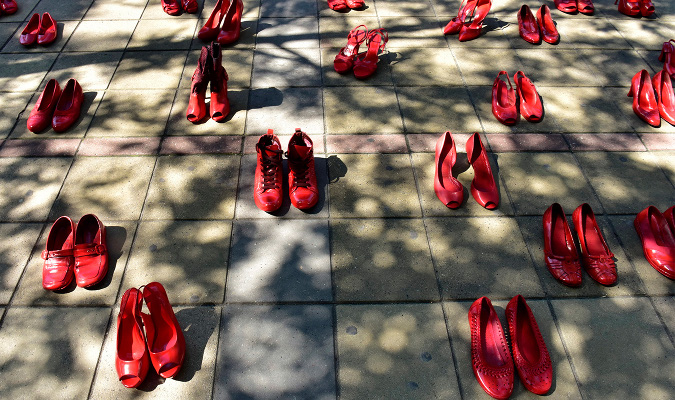Serbia fights to curb violence against women
Following the killing of two women in the same week in July, Serbia is intensifying efforts to tackle a rising tide of gender-based violence.Date:

40 pairs of red shoes have found its place in front of the Serbian Government's building as a reminder that more than 40 women in the country are killed every year by their intimate partner. Photo: Marija Jankovic
“Stop femicide”, "Let's react before it's too late" and "Why are they not among us?" are some of the messages which flooded social media in Serbia over the summer. Banners carrying the same messages also appeared on the streets and these sentiments have been reiterated by state officials and national authorities.
Calls to curb domestic violence in Serbia are mounting after two women and a child were killed in two separate incidents in the same week in July. The incidents both happened in social care centres in Belgrade: one man stabbed his ex-wife and son to death, wounding three social workers, while the other killed his wife in front of their three children.
For years, violence against women and girls has been a persistent problem in Serbia. Statistics of the Autonomous Women’s Center in Serbia show that every second a woman suffers some form of violence. In the past ten years, 330 women have been killed as a result of gender-based violence. And these are only the reported cases.
For Biljana Maletin, an activist from the Women's Platform for the Development of Serbia, the spate of killings is a consequence of the lack of cooperation between institutions responsible for preventing violence (the police, prosecutors, courts, social services and other actors) and the patriarchal nature of Serbian society.
“The more patriarchal society is, the more it justifies and tolerates violence against women; and the less it talks about it and the less able it is to prevent it. A change in social norms and trends starts with the state and its interventions," said Maletin. "The education system, the media and cultural practices also play an important role," she added.
The country’s legislative framework has improved since Serbia ratified the Council of Europe Convention on preventing and combating violence against women and domestic violence (Istanbul Convention) in 2013. The Law on Prevention of Domestic Violence, which introduces changes to existing practices related to the institutional response to violence, entered into force on 1 June, 2017. The Law introduces urgent measures for removing perpetrators from their family and prohibiting them from approaching their victims. It also stipulates professional and disciplinary liability for officials who fail to act in accordance with the Law. The Serbian parliament has also adopted changes to the Criminal Code, introducing new criminal offences for domestic violence and tougher penalties.
"A well-regulated state, a functioning legal system, and institutions that adequately respond, have the power to change minds and reduce the frightening figures of violence against women in Serbia,” says Jelena Milovanovic, UN Women Technical Project Analyst in Serbia.
UN Women in Serbia is taking action with a series of activities within the three-year European Union–UN Women regional programme – Ending Violence against Women in the Western Balkans and Turkey: Implementing Norms, Changing Minds. The initiative promotes favourable social norms and attitudes to prevent gender discrimination and violence against women. It also works to empower women and girls, including those from disadvantaged groups, to advocate for accessible, quality services, along with the full implementation of legislative frameworks in line with international standards.